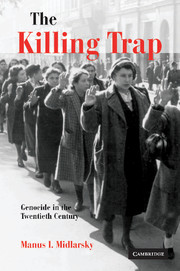Book contents
- Frontmatter
- Contents
- Preface
- PART I Introduction
- PART II Explaining perpetrators: theoretical foundations
- PART III The theory applied
- 6 Threat of numbers, realpolitik, and ethnic cleansing
- 7 Realpolitik and loss
- 8 The need for unity and altruistic punishment
- 9 Perpetrating states
- PART IV Victim vulnerability: explaining magnitude and manner of dying
- PART V Exceptions
- PART VI Conclusion
- References
- Index
7 - Realpolitik and loss
Published online by Cambridge University Press: 22 September 2009
- Frontmatter
- Contents
- Preface
- PART I Introduction
- PART II Explaining perpetrators: theoretical foundations
- PART III The theory applied
- 6 Threat of numbers, realpolitik, and ethnic cleansing
- 7 Realpolitik and loss
- 8 The need for unity and altruistic punishment
- 9 Perpetrating states
- PART IV Victim vulnerability: explaining magnitude and manner of dying
- PART V Exceptions
- PART VI Conclusion
- References
- Index
Summary
The path is now open for an empirical examination of the full theoretical complement of realpolitik, loss, and their consequences for genocide, as suggested in chapter 5. Loss is the initial variable that sets the entire sequence in motion, ending in genocide. In each of the three cases of genocide studied here, first the domain of losses and state insecurity (suggesting the beginnings of brute force realpolitik) are explored, followed by risk acceptance, minimization, and loss compensation as indicated in figure 5.1. Examination of altruistic punishment will be left to the succeeding chapter.
The Holocaust
The domain of losses and state insecurity
Turning first to the most extensive genocide and one that is most surprising because of the utter absence of opposition, among most Jews, to either Germany or German culture prior to the Nazi period, World War I provides the key. Indeed, World War I is the reference point around which many, even most of the Nazi perceptions were framed. As we saw in chapter 6, territorial losses were not confined to former colonies and ethnically Polish territories in the East, but also encompassed the enormous losses of European territory occupied by Germany in 1918 prior to the Armistice.
The dimension of loss was magnified immeasurably by the appearance of refugees from the lost territories. A contraction of socioeconomic space had been effected with visible consequences.
- Type
- Chapter
- Information
- The Killing TrapGenocide in the Twentieth Century, pp. 135 - 168Publisher: Cambridge University PressPrint publication year: 2005



